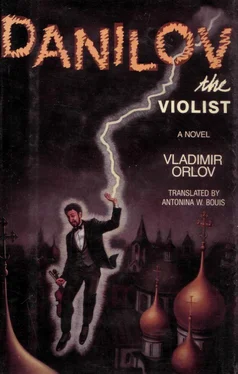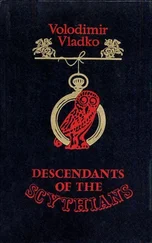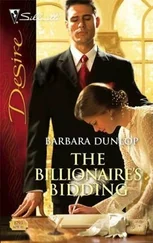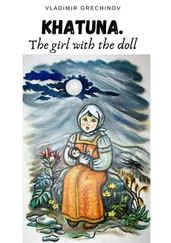At six-forty Danilov rushed to the main entrance. He had left tickets for Natasha on the right side, and he was planning to wait near the ticket taker there. But Natasha, program in hand, was already on her way up to the auditorium.
"Natashenka! Hello!" Danilov exclaimed.
"Hello, Volodya," Natasha said with a smile.
"Don't think badly of me for getting you a seat in the family circle. The important thing is for the box to be near the center..."
How he played, Danilov did not remember, but he must have played well. His music had no Josй, no Carmen, no workers from the Seville tobacco factory, no boys with guns, only Natasha and himself. And his viola seemed to possess the same beautiful tone that the Albani had, a sound that floated up from the pit, from the viola section into the sweet heavens of music, to the crystal garden of the large chandelier and even higher than that. Only the occasional appearance of the toreador's theme caused Danilov to worry. Then he thought about Karmadon and determined not to allow anything untoward to happen at the corrida. But now that he was near Natasha, he felt he could not leave his human state, even for an instant. He convinced himself that Karmadon would not wake up and there would be no problems. Then Danilov completely forgot about Karmadon.
He forgot not only about Karmadon, but also about Time X.
He and Natasha walked down deserted alleys toward Khokhly. Down Kitai-Gorod, then Solyanka, and then they turned down Bolshoi Ivanovsky to Kolpachny, to the palace of Mazeppa.* The cold air sobered up Danilov a bit, and he surreptitiously felt for the indicator in his coat pocket. The last walk had been all too memorable for Danilov. He wasn't afraid for his instrument this time, but for Natasha, and he was determined to thwart the efforts of that ambitious chess player Valentin Sergeyevich.
"Here, on Kolpachny," Danilov said, "once upon a time Rachka creek ran down the hill, and all around were the Gardens of Vasili the Third. That's why the hetman's palace has its back wall to Kolpachny, and as you can see, it looks modest here, all the beauty and pomp are inside..."
The hetman's palace was covered with scaffolding, for restoration. Natasha wanted to see the building from its courtyard, and they went through the arch. The moon illuminated the courtyard; however, Natasha tripped on a squared beam of polished white stone, and Danilov quickly grabbed her arm. Touching Natasha's arm excited him as if he were a teenager. Even inside the courtyard the palace was covered with scaffolding. In the semidarkness and through the planks Danilov still managed to point out the paired columns, recently uncovered by the restorers, and the sumptuous trim with broken pediments on the upper windows. The temporary door, which was covered with thick felt, bore a sign: "No admittance. Construction zone." Natasha pulled on the door and it opened.
"I've got some matches," Danilov said.
He lit a twist of newspaper and illuminated the cellar. The walls were white stone. Natasha proceeded down the plank walkway with determination, and stopped where there should have been a floor, near the wheelbarrows containing some congealed solution.
"What a miracle!" Natasha said. "Mazeppa probably came down here with a candle in his hand; this was the place to hide one's secret thoughts or recall them. Or gloat over treasures in their caskets. Hetman! Mazeppa! Where are you?" Natasha called.
Danilov walked carefully on the walkway. He wanted to tell Natasha that Mazeppa may never have lived in this palace -- it was a controversial point. He also wanted to praise Tchaikovsky for Mazeppa's arioso in the second act, "Oh, Maria ..." But he cut himself short: "What a bore I am today!" The newspaper was burning down, the polished white stones of the wall were losing their shape, swaying, and listing.
Danilov tossed away the ashen paper and embraced Natasha in the dark. Once more her lips were pliant and she did not move away.
"Don't say anything now, Volodya," Natasha whispered. "Don't..."
From the palace to Natasha's house was about two minutes by the back way. But they wandered around for another hour, or maybe two, in the alleys near Pokrovka.
"Natasha," Danilov said, "I must have hurt your feelings by not calling after Korenev's funeral..."
"I wasn't hurt," Natasha said. "I was just feeling terrible. And I wanted someone to lean on -- out of weakness, I suppose, and depression... I'm not blaming you ... you didn't know..."
"I should have known," Danilov said. "There's no excuse."
"Volodya, you didn't know this, but I used to love Misha Korenev -- eight years ago it was, but I loved him... I told you that I ran away to Perm with the man I loved and met Misha there. That's not true. I ran away with Misha. He was the man I loved..."
"Then you did come to the program because of Misha?" Danilov said carefully.
"No, Volodya. All that was over. It was very painful. But I felt sorry for Misha. I never thought he was capable of killing himself... You need strength for that, and he didn't have any... May I have a cigarette, Volodya?"
Placing his instrument on the ground, Danilov sheltered Natasha's cheeks from the wind as she lit the cigarette.
"He had left his family, his orchestra back then. He wanted to drop everything and start all over. He went to Perm. He began working in a theater, in the music department, and rented a room on Motovilikha in a wooden house. I lived with him. The opportunity arose to create a youth ensemble to play ancient music: strings, woodwinds, and clavichord. They wanted to play baroque music -- Monteverdi, and other forgotten composers. Misha was made director.
"I was only seventeen, a silly little fool, I wanted to be an actress, but I flunked the entrance to Shehepkinsky Institute. Misha said he would get me into his theater and things would take off... Their group was working out, although there were a lot of hassles; why did they want to play Monteverdi, and so on -- you can imagine it. Misha suffered; he lived on hope for a year and a half. » He was passionate, impatient. After a talk he had at the cultural section or some such place, he kept pacing the room and repeating: 'Dead end! Dead end! What a horror show! This is really the sticks!' And he took the night train to Moscow.
"I didn't go. I felt I was a burden to him, even though he still loved me... The landlady treated me like an abandoned mistress... I should have had a child, but I didn't... I wasn't a good actress, but I held on to the theater, or it held on to me. I worked in costumes, I sewed well, and I liked it ...and then when Misha was gone, it was all meaningless, I just gave up ... for a long time ... if not forever..."
Natasha stopped talking. They turned down'Starosadsky Alley, and there, beyond the corner and to the left, was Kolpachny again.
"Misha once said to me," Danilov spoke, "'Remember! He who is afraid is incomplete in love!' "
"He wrote that to me, too. And he also wrote something very strange... I can only guess at what he meant... Something was tormenting him toward the end, some mystery..."
Danilov had no doubts that there was something strange and mysterious in Misha's story. In the past few days Korenev had come to mind more than once, and Danilov tried, in vain, to understand Misha's action. But how could he!
Natasha said, "Back then I was the one who could have jumped into the Kama River. I could have... He often wrote to me from Moscow, swearing he loved me... But I got over it... and the ensemble worked out fine, they were even sent abroad to perform... But it worked out without Misha."
"I heard," Danilov said with a nod.
"Then I came back to Moscow," Natasha said. "Things weren't good with my parents... They didn't say anything, but they reproached me with their silence... They got me a job at the research institute, to keep me busy... I was a stranger to them, they didn't understand me... Through the institute, I got a room in a communal apartment, so I could live alone... I feel sorry for Misha ... and I feel bad ... as if something bad is about to happen..."
Читать дальше












